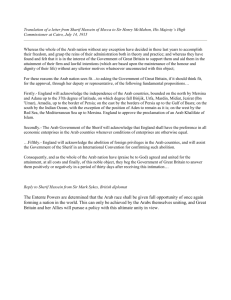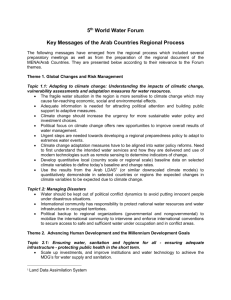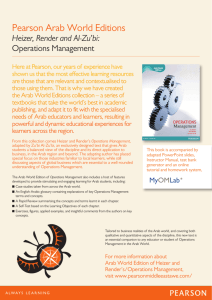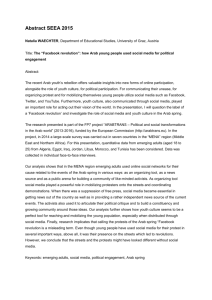TRAINING APPLICATIONS USING THE ARAB BOARD IN EM
advertisement
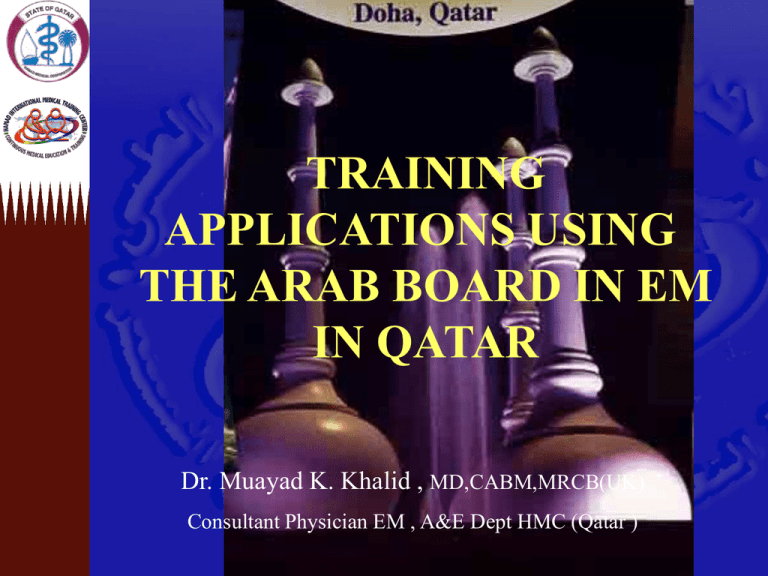
TRAINING APPLICATIONS USING THE ARAB BOARD IN EM IN QATAR Dr. Muayad K. Khalid , MD,CABM,MRCB(UK) Consultant Physician EM , A&E Dept HMC (Qatar ) OVERVIEW • INTRODUCTION • EDUCATIONA GOALS AND OBJECTIVES • PROGRAM REQUIRMENTS • TRAINING PROGRAM STRUCTURE • EXAMINATION & CERTIFICATION INTRODUCTION • The initiative to include the program of Arab Board in Emergency Medicine in the Arab Council of Medical Specializations came from Qatar in 1998 • A comprehensive program was forwarded to the council and it was approved. • The first group of residents joined the program in the year 2000. Educational Goals & Objectives • 1- to educate the physician in developing his expertise in recognition and initial management of the broad spectrum of multidisciplinary problems encountered in ED. • 2-To develop the behavioral ,diagnostic, interpretive , procedural and administrative skills for the physician to provide leadership in the specialty of EM. • 3- To contribute to the advancement of knowledge in the discipline of EM thru research. General Objectives • The graduate of Board in EM training program is expected to demonstrate Consultant level abilities in the recognition,understanding and treatment of illness and injuries presenting to an ED, eventually he will have the clinical , Administrative and supervisory skills necessary for the work in ED . Specific Objectives 1-Principles of Emergency Care. 2-Acute disorders by Body systems 3-Trauma 4-Acute age related disorders 5-Toxicology 6-Environmental disorders 7-Disaster Medicine 8-Investigative Modalities in EM 9-Manipulative /procedural skills in EM 10- Emergency Medical Services Systems Evidence Based practice whenever possible Program Requirements Accreditation Process of EM training Departments: 1- Commitment of the hospital to postgraduate training 2-The capacity of ED to provide adequate experience in EM. 3-Training and research environment 4- Proper Department design ,adequate equipment and facilities. 5- Any concerns raised by the trainee reports. PROGRAM TEACHING STAFF PROGRAM DIRECTOR: 1- Should hold higher medical specialty qualification preferably in EM. 2-Minimum 3 years experience in EM 3-Has experience in Medical Education & Training TRAINERS 1- Should have higher qualification in one of the clinical specialties,e.g:EM,Surgery,Internal Medicine,Cardiology. 2-Other Specialty should have at least 3 years experience in EM. Should show interest in Training & Education. TRAINING PROGRAM STRUCTURE No. Program Time Period 1- Emergency Medicine 24 Months 2- Holiday 4 months 3- Elective 1 month 4- General Surgery 6 months 5- Internal Medicine 3 months 6- ICU/CCU/Anesthesia 5 months 7- Psychiatry/ OBS &GYN 1 month each 8- Family Medicine 1 month 9- Radiology 1 month 10- ENT/ Ophthalmology 1 month Training Program Rotations Phase 1 – Year 1 & 2 No. Program Period of retation 1- EM including Pediatric Emergency 10 Months 2- Surgery includes: 2 months General Surgery 2 months Orthopedic surgery 1 month Neurosurgery 1 month Plastis surgery & Burns 6 months 3- Internal Medicine 3 months 4- CCU & Cardiology / SICU & TICU 3-4 MONTHS 5- Vacation 2 months TRAINING PROGRAM Phase 2 – Year 3 & 4 No. Program 123456- EM including Ped. Emergency 789- ENT & Ophth. Anesthesia OBS/GYN Family Medicine Clinical Imaging Psychiatry Elective Vacation Training Period 14 month 1-2 months 1 month 1 month 1 month 1 month 1 month 1 month 2 months Core content of EM training 1- Principles of EM care 2- Acute disorders of body systems 3- Trauma care 4- Acute age related disorders 5- Toxicology 6- Environmental Disorders 7- Emergency Preparedness & Disaster Medicine 8- Investigative modalities in EM 9- Procedural skills in EM 10- Emergency Medical Services System Examinations & Certification 1- Certification of completion of 4 year Training Program in EM center recognized by the Arab Board Scientific Council. 2- Candidate must pass the 1st & 2nd( final) examination of EM program 3- The maximum training period for the candidate to be certified is 8 years 4- Examinations:1st Written part 2nd part written and Objective Structured Clinical Exam.(OSCE) PROGRAM EVALUATION 1- Program Assessment:Internal Review ,responsibility of Local Program Director, External Review, responsibility of Arab Board of EM Training and Accreditation committee. 2- Resident Assessment: 3- Faculty Assessment LOCAL APPLICATIONS ARAB BOARD DAY: HELD WEEKLY • EVERY TUESDAY, IT IS EDUCATIONAL • ACTIVITY FROM 8:30 AM – 11:30 AM,ARAB BOARD RESIDENTS PARTRICIPATE WITH MOTRTALITY MORBIDITY REVIEW,JOURNAL CLUB, AND LECTURES ON AN EMERGENCY MEDICINE TOPIC FOLLOWED BY Q&A SESSION. HAMAD INTERNATIONAL TRAINING • CENTER :OFFERS ALL ALS COURSES TO THE CANDIDATES. Number and level of residents • 1st Year residents : 8 candidates • 2nd Year residents : 7 candidates • 3rd year residents : 8 candidates ,the attempted the 1st part written examination 5 passed Summery • Arab Board program in EM specialty is newly administered to the Arab Council of Medical Specializations. • There is a structured program going on in recognized hospitals in the region . • There is growing interest in specialty by young doctors.


